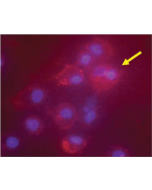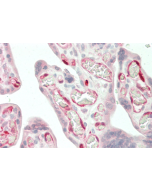Cookie Policy: This site uses cookies to improve your experience. You can find out more about our use of cookies in our Privacy Policy. By continuing to browse this site you agree to our use of cookies.
AdipoGen Life Sciences
IDO1 (human) (rec.) (His) (highly active)

| Product Details | |
|---|---|
| Synonyms | Indoleamine 2,3-dioxygenase 1; INDO; IDO |
| Product Type | Protein |
| Properties | |
| Source/Host | E. coli |
| Sequence |
Human IDO1 (aa 1-403) is fused at the N-terminus to a His-tag. |
| Crossreactivity | Human |
| Biological Activity |
Specific Activity: >100’000U/mg protein with L-tryptophan as substrate (activity assay with catalase). One unit is defined as the amount of enzyme that produces 1nmol of N-formylkynurenine (NFK) per hour. For more information see Activity Test Protocol. |
| MW | ~47kDa (SDS-PAGE) |
| Purity | ≥90% (SDS-PAGE) |
| Endotoxin Content | <0.1EU/μg purified protein (LAL test). |
| Concentration | Lot dependent |
| Formulation | Liquid. 0.2μm-filtered solution in 10mM Tris, pH 7.5, containing 100mM NaCl and 20% glycerol. |
| Other Product Data |
UniProt link P14902: Indoleamine 2,3-dioxygenase 1 (human) |
| Shipping and Handling | |
| Shipping | DRY ICE |
| Short Term Storage | -20°C |
| Long Term Storage | -80°C |
| Handling Advice |
After opening, prepare aliquots and store at -80°C. Avoid freeze/thaw cycles. |
| Use/Stability | Stable for at least 1 year after receipt when stored at -80°C. |
| Documents | |
| Protocols |
 Download PDF Download PDF |
| MSDS |
 Download PDF Download PDF |
| Product Specification Sheet | |
| Datasheet |
 Download PDF Download PDF |
IDO1 is a heme enzyme that catalyzes the first and rate-limiting step in the main pathway of human tryptophan catabolism, the kynurenine pathway, causing depletion of tryptophan which can lead to halted growth of microbes as well as T cells. IDO1 is an immune checkpoint protein, thought to play a role in a variety of pathophysiological processes such as antimicrobial and antitumor defense, neuropathology, immunoregulation and antioxidant activity. Cancer cells are able to evade the immune system is by hijacking the checkpoint proteins. Increased IDO1 protein levels drive growth arrest and apoptosis of the effector T cells, a group of immune cells that mediate the immune system’s ability to destroy pathogens. By reducing the number of effector T cells, IDO1 overexpression prevents the immune system from effectively destroying cancer cells. IDO1 overexpression has been observed in a wide range of human cancers such as prostatic, colorectal, pancreatic, cervical, gastric, ovarian, head or lung cancer. Physiological IDO1 activity has been implicated in T cell tolerance to tumors, dysfunctional selftolerance in non-obese diabetic (NOD) mice, and as a protective negative regulator in autoimmune disorders. Biological active IDO1 enzyme can be used for screening of IDO1 inhibitors, which have shown promising antitumor activity and appear to be synergistic in combination with chemotherapy and other forms of immunotherapy.







